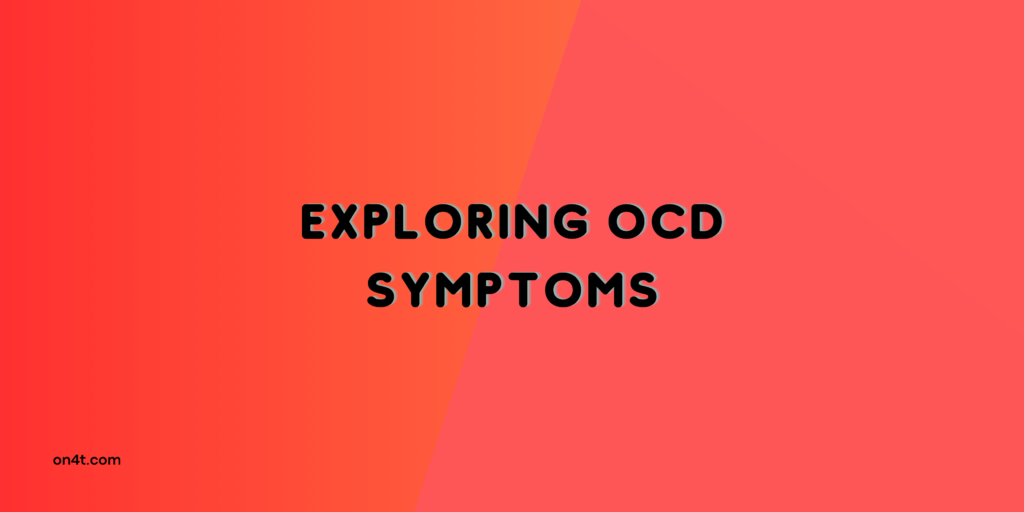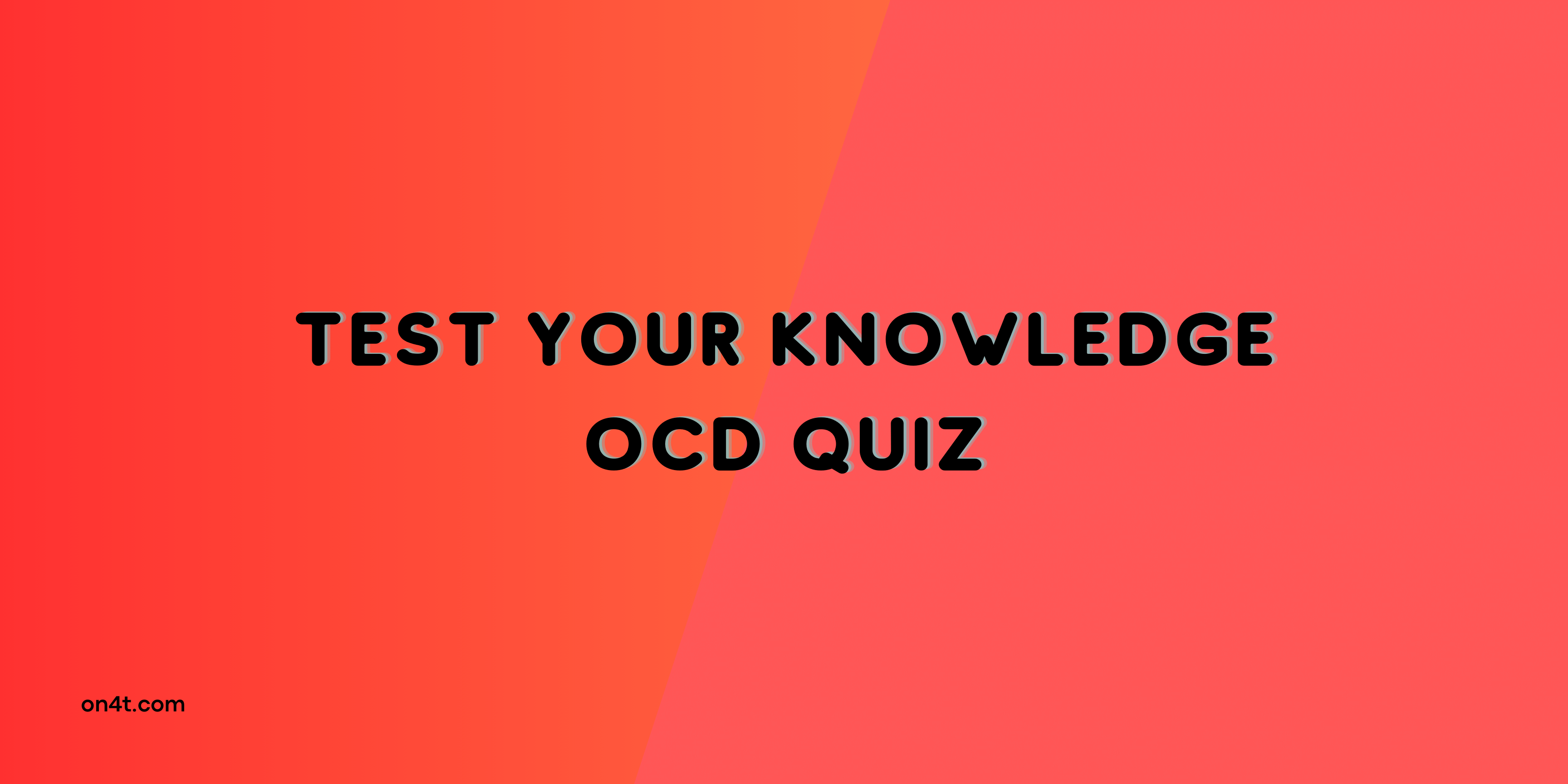Are you curious about OCD? Take the OCD Quiz to test your knowledge about this condition. OCD, or Obsessive-Compulsive Disorder, is a mental health condition characterized by intrusive thoughts (obsessions) and repetitive behaviors (compulsions).
In this article, we will discuss the Test Your Knowledge OCD Quiz. It’s a simple way to learn more about OCD and its symptoms. Let’s dive in and see how much you know about this important topic.
Understanding OCD
Obsessive-Compulsive Disorder (OCD) is a mental health condition where people have unwanted thoughts, or obsessions, that make them feel anxious. They often feel the need to perform repetitive behaviors, or compulsions, to ease their anxiety. For example, someone might have an obsession with cleanliness and feel the need to constantly wash their hands.
To understand OCD better, you can take an OCD Quiz. This quiz can help you recognize symptoms and understand how they impact your daily life. It’s important to remember that OCD is treatable, and seeking help from a mental health professional can make a big difference in managing symptoms and improving overall quality of life.
By learning more about OCD and taking steps to address it, individuals can gain better control over their thoughts and behaviors. Treatment options may include therapy, medication, or a combination of both. With support and understanding, individuals with OCD can lead fulfilling lives and reduce the impact of their symptoms on their daily activities.
Exploring OCD Symptoms

“Exploring OCD Symptoms” is an insightful exploration of the signs and effects of Obsessive-Compulsive Disorder (OCD). It uncovers the repetitive behaviors that characterize OCD, like constant checking or counting. These behaviors often stem from intrusive thoughts that cause distress and anxiety.

By understanding OCD symptoms, individuals can better comprehend their experiences and seek appropriate help. Through an OCD Quiz, people can self-assess their symptoms and gauge the severity of their condition. Early recognition and intervention can lead to effective management strategies and improved quality of life.
This content emphasizes the importance of recognizing OCD symptoms for timely intervention. It encourages individuals to take proactive steps towards seeking support and treatment. By addressing OCD symptoms early on, individuals can navigate their challenges and lead fulfilling lives.
Why Take the OCD Quiz?
Wondering why you should take the OCD Quiz? Well, it’s a quick and easy way to learn about Obsessive-Compulsive Disorder. This quiz can shed light on whether you experience symptoms like repetitive actions or unwanted thoughts that might be signs of OCD.
Understanding OCD is the first step to getting help if you need it. By taking the OCD Quiz, you’re taking a proactive approach to your well-being. You’ll gain valuable insights into your mental health and be better equipped to discuss your concerns with a healthcare professional if necessary.
In short, taking the OCD Quiz is a simple yet impactful way to learn more about yourself and your mental health. It’s a tool that can provide clarity and guidance if you suspect you might be experiencing symptoms of Obsessive-Compulsive Disorder.
How the OCD Quiz Works
The OCD Quiz is a simple yet effective tool designed to help individuals assess if they may be experiencing symptoms of Obsessive-Compulsive Disorder (OCD). It consists of a series of questions that prompt users to reflect on their thoughts and behaviors.
After completing the quiz, users receive feedback based on their responses. This feedback provides insight into whether their symptoms suggest a potential diagnosis of OCD. While the quiz does not serve as a substitute for professional diagnosis, it can serve as a valuable starting point for discussions with healthcare providers.
In summary, the OCD Quiz offers a user-friendly way for individuals to assess their experiences and consider whether they may be indicative of OCD. By providing feedback based on user responses, the quiz can empower individuals to take proactive steps towards seeking appropriate support and guidance for their mental health needs.
Sample Quiz Questions
What does OCD stand for?
a) Obsessive-Care Disorder
b) Obsessive-Compulsive Disorder
c) Overly Concerned Dilemma
d) Outrageous Cleaning Disorder
Which of the following is a common symptom of OCD?
a) Being organized
b) Feeling happy all the time
c) Repeating actions or thoughts
d) Never worrying about anything
Which treatment is commonly used for managing OCD?
a) Meditation
b) Exposure therapy
c) Acupuncture
d) Vitamin supplements
What are obsessions in OCD?
a) Strong interests in hobbies
b) Unwanted thoughts or urges that repeatedly come into your mind
c) Fears of heights
d) A type of medication
Which of the following is a common compulsion in OCD?
a) Listening to music
b) Washing hands excessively
c) Watching TV
d) Playing sports
Interpreting Quiz Results
When you finish an OCD quiz, it’s important to interpret the results. These quizzes aim to identify signs of obsessive-compulsive disorder (OCD). By analyzing the results, you can gauge if you exhibit symptoms of OCD
Your OCD quiz results offer valuable information about your mental well-being. They indicate whether you might benefit from professional support or therapy. Understanding these results empowers you to take proactive steps towards improving your mental health.
Interpreting your OCD quiz outcomes is a crucial step in managing your mental health. It enables you to recognize patterns of behavior and thoughts associated with OCD. With this awareness, you can explore strategies to cope with symptoms and enhance your overall well-being.
Benefits of Mental Health Awareness
Mental health awareness plays a vital role in recognizing and understanding conditions such as OCD, or Obsessive-Compulsive Disorder. Through increased awareness, individuals can better identify the signs and symptoms of OCD, enabling them to seek appropriate help and support.
Participating in the OCD Quiz not only enhances personal understanding but also contributes to breaking down societal stigmas surrounding mental health. By engaging with quizzes and educational resources focused on OCD, individuals can develop empathy and compassion for those affected by the disorder.
Overall, promoting mental health awareness through initiatives like the OCD Quiz is essential for building a more knowledgeable and empathetic society. By empowering individuals with information about OCD, we can work towards creating a world where everyone feels understood, accepted, and supported in their mental health journey.
FAQs
What is the OCD quiz about?
It’s a quiz designed to test your knowledge about Obsessive-Compulsive Disorder (OCD). You’ll answer questions related to its symptoms, causes, treatments, and more.
Who should take this quiz?
Anyone interested in learning more about OCD or those who suspect they might have OCD can take this quiz. It’s also helpful for friends and family of individuals with OCD to understand the condition better.
How long does the quiz take?
The quiz typically takes around 10-15 minutes to complete, but it can vary depending on how quickly you answer the questions.
Is the quiz accurate?
While the quiz is designed to provide accurate information, it’s essential to remember that it’s not a substitute for professional medical advice. If you have concerns about OCD or any other mental health condition, it’s best to consult a healthcare professional.
Conclusion
So, after diving into the OCD quiz, you’ve tested your understanding of the condition. Through various questions, you explored different aspects of OCD, from its symptoms to its impact on daily life. By engaging with this quiz, you’ve taken a step toward understanding OCD better and raising awareness about it. Youu can also checkout our recent blog on history quiz.
Remember, awareness and understanding are crucial in supporting those affected by OCD and fostering empathy in our communities. Keep learning and spreading knowledge about mental health!